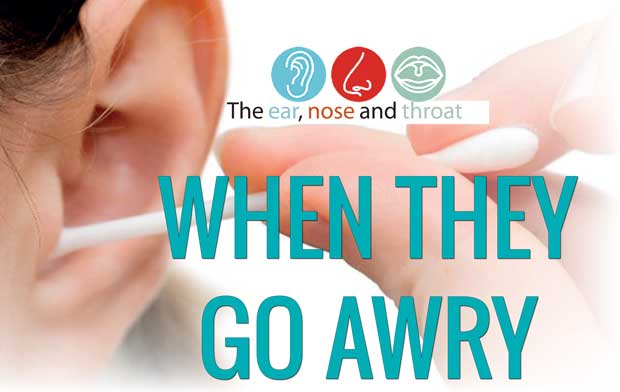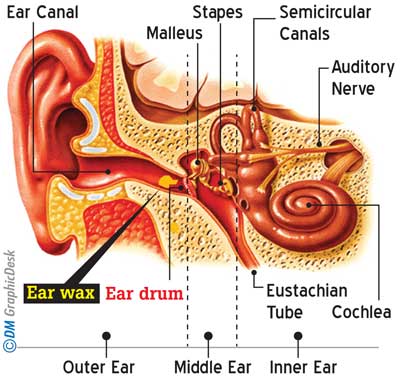Reply To:
Name - Reply Comment

 People are generally unaware of the presence of a host of organs in their bodies. But when they are brought into focus when they fall sick, physicians are consulted and remedies are sought. However when there is a feeling that something is wrong with the ears, nose and throat, they are usually chalked down as a symptom of an ordinary cold. Surprisingly some of these symptoms may not be caused by a cold at all. Mirror Medicine spoke to Consultant ENT surgeon at the National Hospital, Colombo, Dr. Chandra Jayasuriya to speak about some of the most common illnesses in the ear, nose and throat.
People are generally unaware of the presence of a host of organs in their bodies. But when they are brought into focus when they fall sick, physicians are consulted and remedies are sought. However when there is a feeling that something is wrong with the ears, nose and throat, they are usually chalked down as a symptom of an ordinary cold. Surprisingly some of these symptoms may not be caused by a cold at all. Mirror Medicine spoke to Consultant ENT surgeon at the National Hospital, Colombo, Dr. Chandra Jayasuriya to speak about some of the most common illnesses in the ear, nose and throat.
Hear this!
According to Dr. Jayasuriya, most patients seek medical advice for problems of the ear. She says the lack of knowledge about problems of the ear compel them to seek a doctor’s advice. “Ear problems are very common among our patients. Out of these injuries resulting from attempts to self-clean the ear are predominant. We see at least five to six patients a day where either the head of a  cotton bud has dislodged and got stuck in the ear, or the patient has damaged the inner walls of the ear or even the ear drum, when trying to clean the ear using things like hairpins,” Dr. Jayasuriya said. “The ear is self-cleaning and there is no need to clean it. The human body produces earwax to keep the ears lubricated, clean and protected. The jaw motions from talking and chewing, along with skin growth within the canal, typically help to move old earwax from inside to the outside the ear. A blocked ear with earwax is treated by removing the wax using a special instrument by an ENT doctor.
cotton bud has dislodged and got stuck in the ear, or the patient has damaged the inner walls of the ear or even the ear drum, when trying to clean the ear using things like hairpins,” Dr. Jayasuriya said. “The ear is self-cleaning and there is no need to clean it. The human body produces earwax to keep the ears lubricated, clean and protected. The jaw motions from talking and chewing, along with skin growth within the canal, typically help to move old earwax from inside to the outside the ear. A blocked ear with earwax is treated by removing the wax using a special instrument by an ENT doctor.
The common cold also results in a number of symptoms that causes discomfort in the ears, nose and throat. However what starts out as a common cold can result in one or more of these organs being subjected to some form of infection. According to Dr. Jayasuriya, continuous bleeding from the ear cavity with no sign of pain can be the telling signs of a chronic ear infection. Such acute infections can harm a person’s ability to hear, damage the ear drum and even cause deafness. Some of the contributory factors to such hearing damage could however be caused by exposure to loud sounds or noise pollution and a foreign body entering the ear canal.

While adults are able to identify symptoms infection or discomfort, in an ear, it proves to be difficult to identify these symptoms in children. Asked how parents can know of a persistent ear problem in a child, Dr. Jayasuriya said children will only be able to identify discomfort within the ear. “Children will complain of severe pain or discomfort in the case of an ear infection, mostly by crying and pulling at the ear. In the case of adults however, deafness, dizziness and vertigo can be a symptom. Some others will complain of hearing noises within the ear known as Tinnitus.” In such cases Dr. Jayasuriya recommends immediate medical attention. The treatment for temporary hearing loss depends on its cause and is often treated successfully usually through antibiotics. In cases of permanent hearing loss, hearing devices may be used to restore hearing and to help with communications.
The sniffles
A blocked or stuffy nose is one of the most common difficulties many endure. This nasal congestion is caused when the tissues lining the nose swell due to inflamed blood vessels. Even though most prefer not to treat a stuffy nose, nasal congestion can eventually lead to hearing and speech problems. If the condition is not treated it may also lead to a condition known as sleep apnea which causes one or several pauses while breathing.
According to Dr. Jayasuriya there are several causes for infections of the nasal cavity; viral infections, allergies and rhinitis. Viral infections are the cause of the common cold, flu and even sinus infections. These viruses are transmitted by air which causes the nasal tissues to swell up resulting in the discharge of nasal mucous. Sinus infection also causes nasal congestion which leads to the thick discharge of mucous. Sinusitis is the inflammation of sinuses in and around the nasal region causing blocked noses.
Another cause for severe discomfort in the nasal cavity are allergies. Allergy occurs due to the inflammatory response to harmless environmental substances known as allergens such as pollen, dust mites, house dust, and animal dander and tobacco smoke.
These allergens releases a substance called histamine which can cause congestion and the excess production of watery mucous. “One of the most common complaints made by patients are allergies caused by hair dye. Sri Lankan adults are accustomed to the practice of colouring their hair frequently to mask grey hair. For this purpose they use black hair dye products. What they do not realise is that our natural hair colour is not black but brown. Therefore most people develop allergies to the black tinting agent. The symptoms of this allergy will present itself as an itchy scalp, headache and redness in and around the contact area,” Dr. Jayasuriya explained. She cautioned that those who wish to colour their hair must first perform a patch test with the chosen product.
Some allergies may develop symptoms such as sneezing, nasal congestion, itchy nose and eyes, running nose, and sore throat. Dr. Jayasuriya opines that prevention or avoidance is the best treatment for allergies. “If the cause of the allergy is identified it should be avoided. For example if you are allergic to some food or animal fur it should be removed or kept away and medications such as the use of an inhaler should be adopted,” she said.
Lump in the throat
According to Dr. Jayasuriya a sore throat is the most common throat disorder among patients, often caused due to common cold and flu. Other conditions that may cause sore throat include, allergies, infection with streptococcal bacteria, smoking, tonsillitis and viral infections. However those with a constant sore throat may realise how simple daily activities such as speaking and eating become difficult with a throat that continues to be itchy and scruffy. Dr Jayasuriya said that patients however prefer to self treat problems of the throat. “ The throat being the common passage for food and air is more susceptible to infections and other conditions. Patients with sore throats may experience pain and difficulty in breathing and swallowing. Fever may also be a symptom. Salt water gargles, drinking lots of liquids and gargling may provide temporary relief from pain. For recurrent sore throat, antibiotics are usually prescribed by doctors.”
Hoarseness is a symptom and not a disease itself. It is a general term that describes abnormal voice changes. When hoarse, the voice may sound breathy, raspy, strained; or there may be changes in volume. Dr. Jayasuriya recommends drinking hot water, speaking only when necessary and also sucking on lozenges and chewing either gum or the root of the herb Velmi to relieve a sore throat. “Patients must also exercise their respiratory track by taking deep breaths and also avoid consuming dairy products such as milk, yoghurt or cheese.”
There are many causes of hoarseness; fortunately, most are not serious and tend to go away in a short period of time. If hoarseness persists longer than two weeks, a visit to your physician is recommended. While not always the case, persistent hoarseness can be a warning sign of a more serious illness.